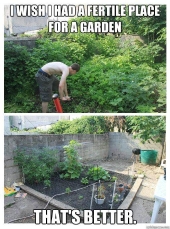posted 13 years ago
I honestly think that permaculture has a lot less gratuitous jargon than most fields, interests and hobbies I have come into contact with. I like this about permaculture.
I don't usually hear permaculturists running around going on and on about anyone who isn't into permaculture, calling them "mundanes", "muggles", "sheeple" or anything like that. I've seen that a lot in other communities. In fact, a lot of communities that I could technically belong to because we share interests I tend to just watch from the outside for this very reason.
Permaculture also has a lot fewer gratuitous abbreviations. These are all over many communities and fields. I recently bought a book that is an introduction to energy efficiency in the home and it had three pages of abbreviation glossary. In survivalist communities, WTSHTF you want to grab your BOB, get in your BOV, GOOD to the BOL and pray that it's not TEOTWAWKI.
The buzzwords do not really bother me, mostly because they often do not seem to be so much buzzwords as romantic dreaming. A tiny urban yard becomes an "urban farm" and a suburban yard becomes a "microfarm", both being what I've always known to just be a kitchen garden. Sure, I've sometimes raised an eyebrow when I've seen a plan for a "food forest" that turned out to be two apple trees, a pear and a plum, with some shrubs in between, and wondered "Where's the forest?", but I don't think the people using these words are trying to be pretentious or divisive. I think that they dream big, have certain values, incorporate certain methodologies/theories, and want to reflect that in the words they use.* And while four trees and some berry shrubs being called a "food forest" may confuse the newbie, I don't think such terminology is really so "out there" that if they saw it applied to something much bigger they wouldn't "get it" rather instinctively.
* I'm guilty of this myself. This autumn we're planting the first dozen trees on our tiny smallholding, and although it'll probably end up being no more than 30 trees total, on account of space, I still call it our food forest when talking to the husband. I don't do it when talking to others, but I'm sure one day, when it's more than just a plan, I'll grow tired of saying "a food forestry inspired orchard" and just refer to it as a "food forest" in quotation marks without trying to be pretentious.
Le blog d'Emma: Homesteading, vintage sewing & knitting, renovating, wildcrafting, etc. in Brittany, France.

 1
1






























 3
3




 1
1













